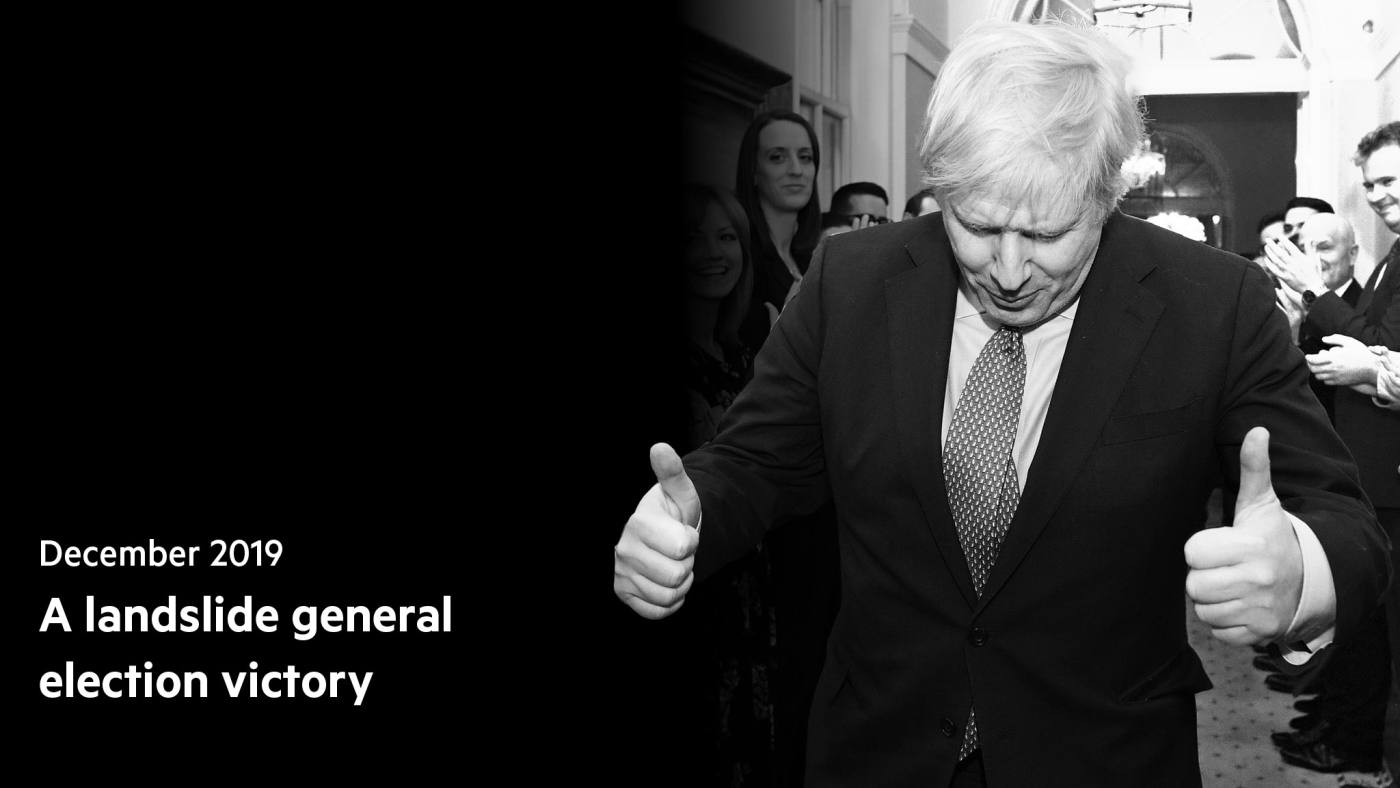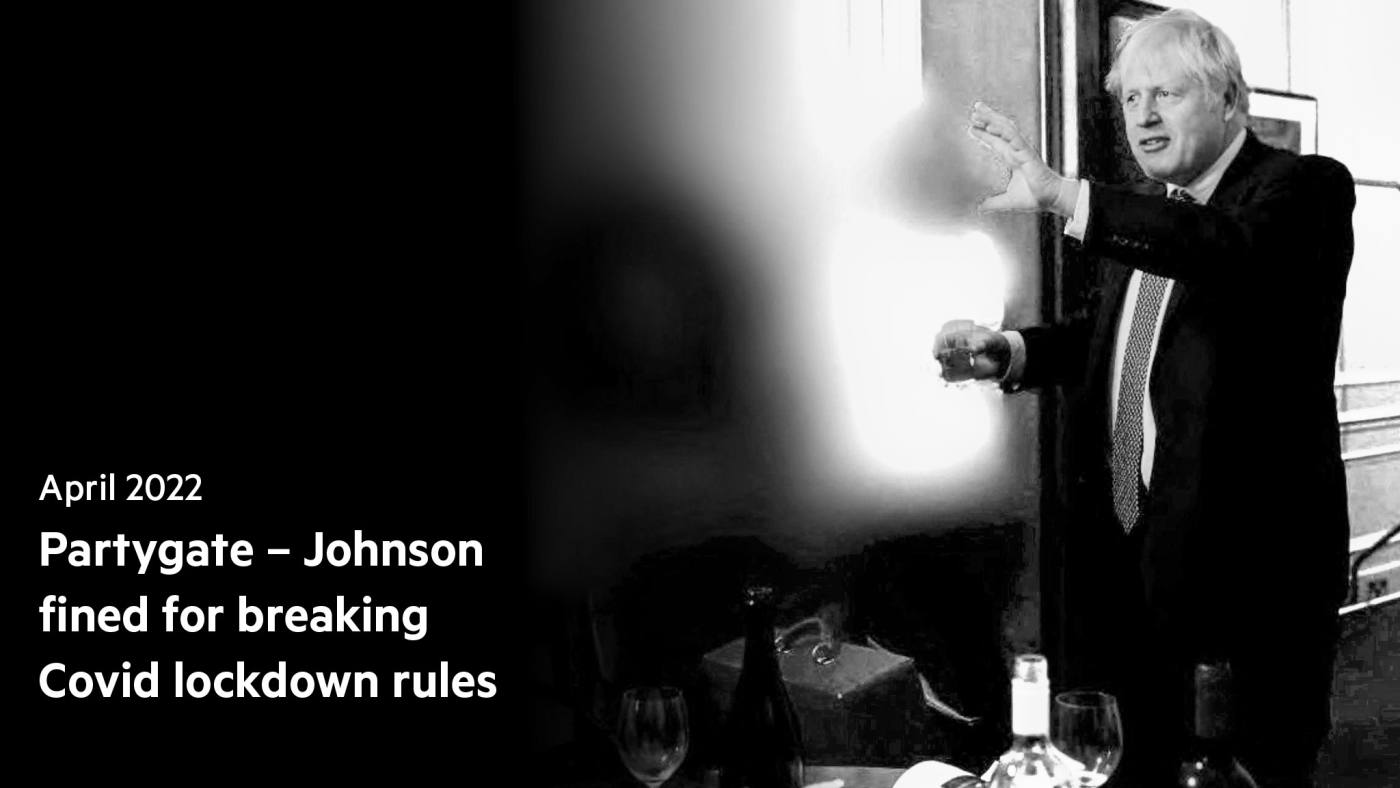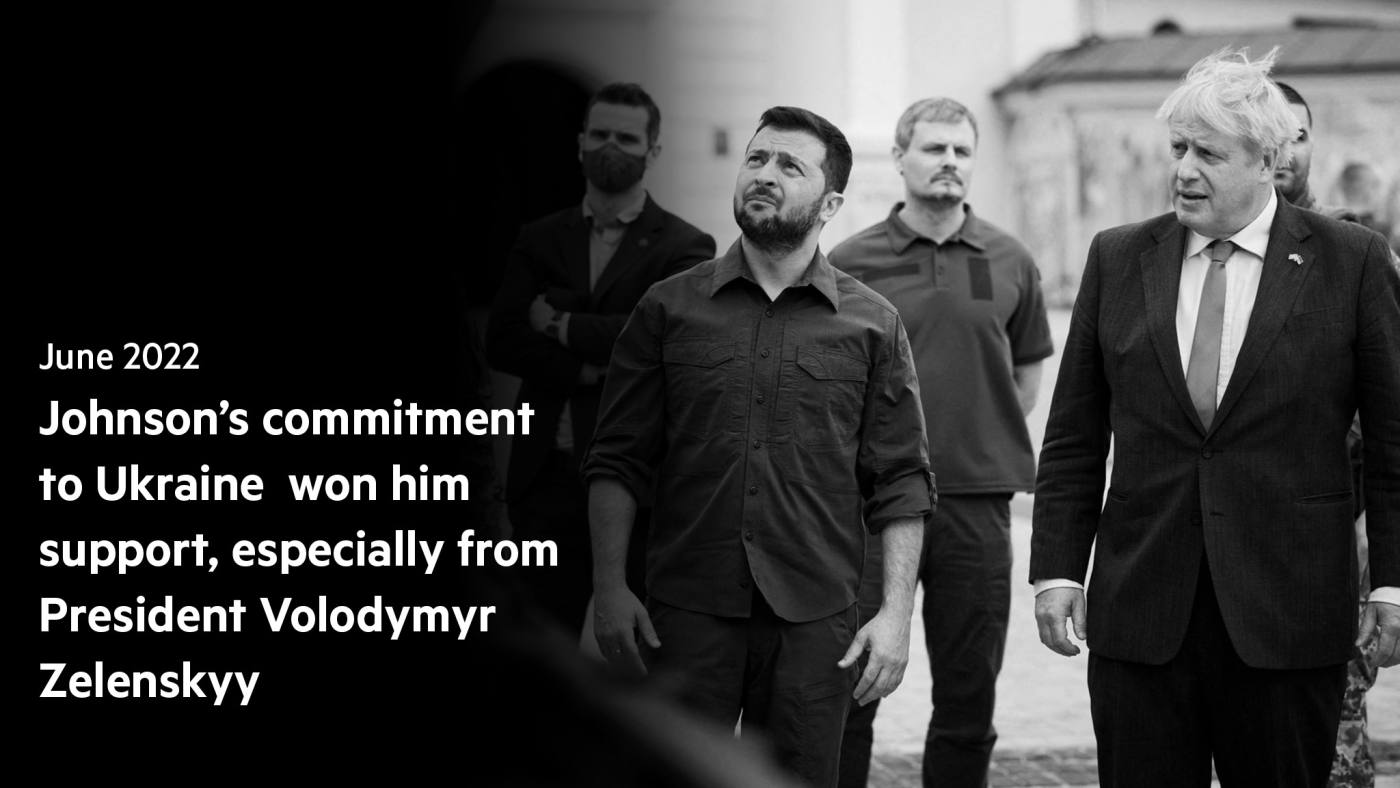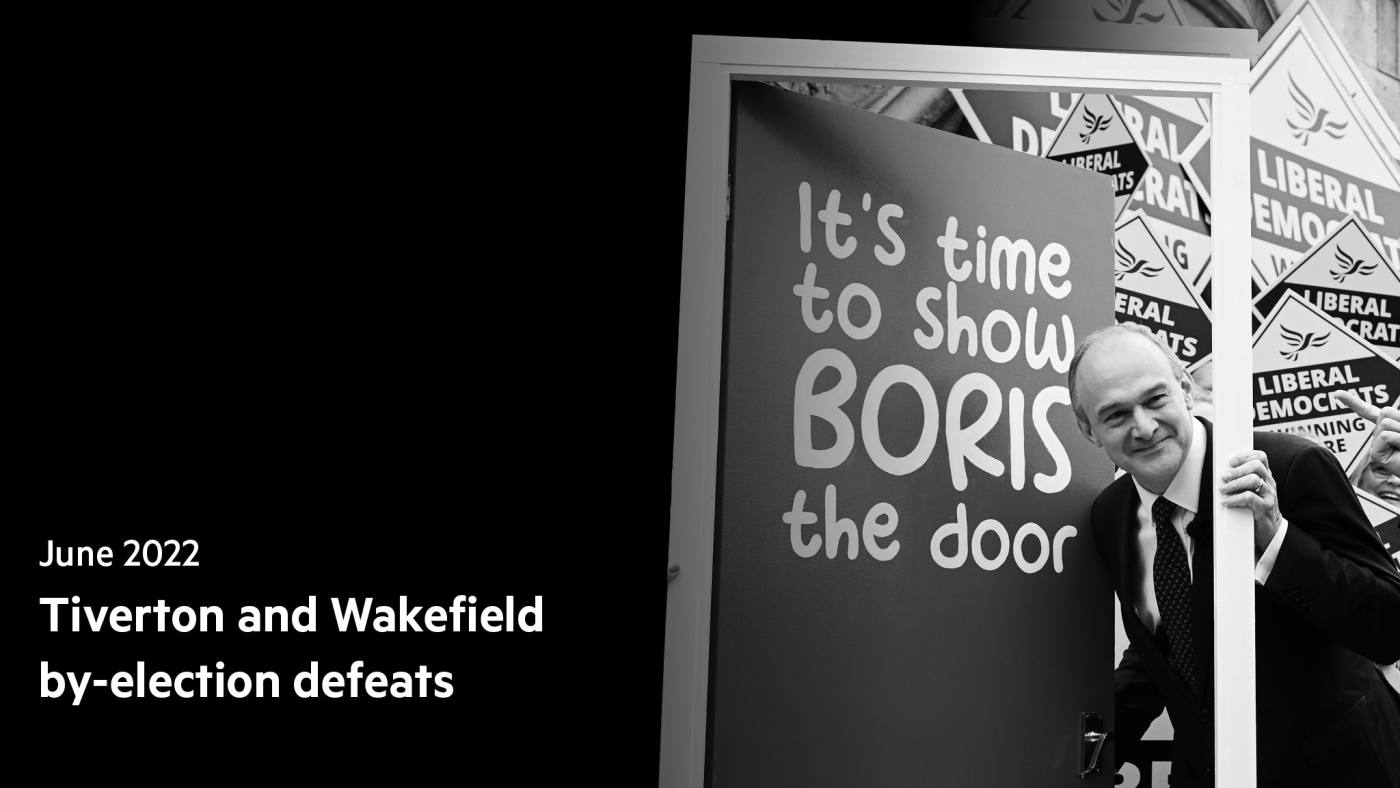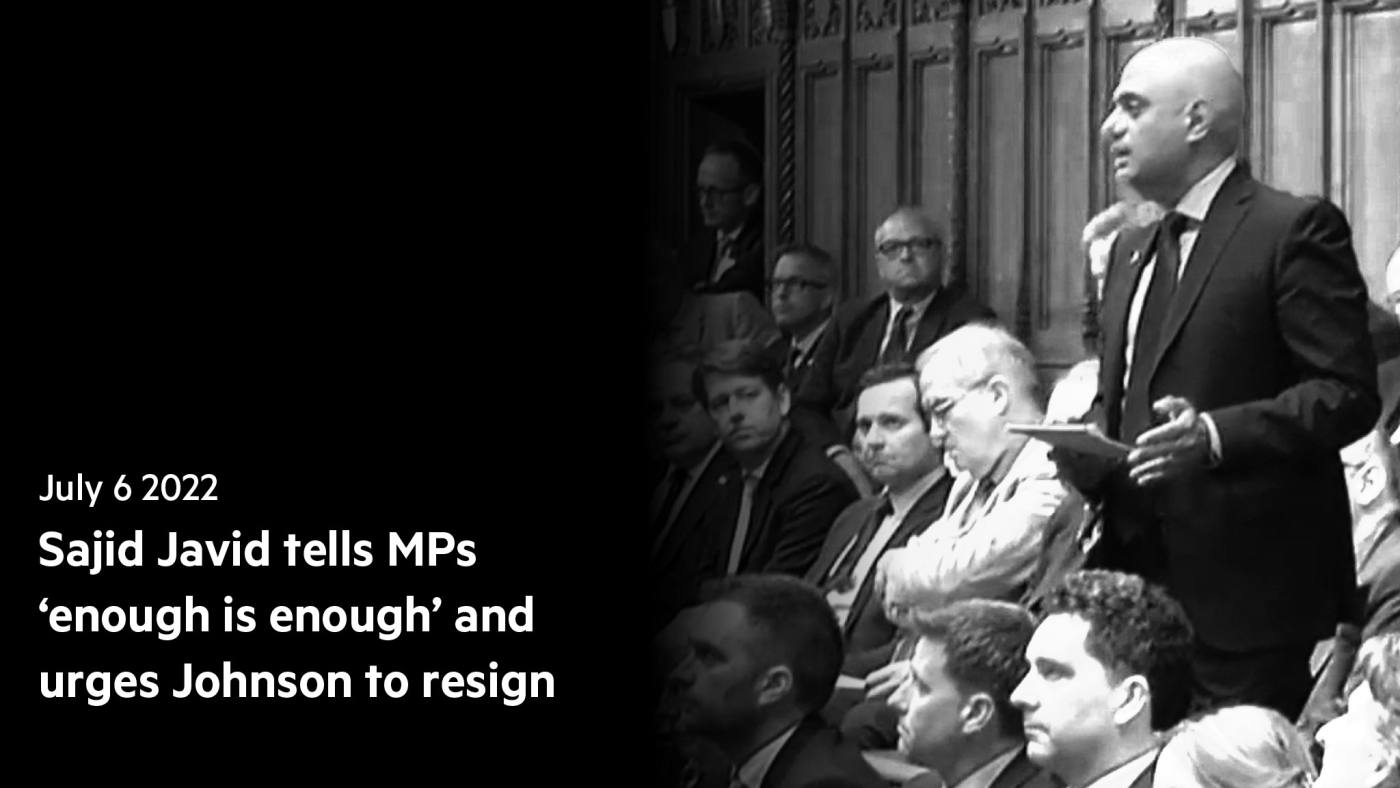There were moist eyes around the cabinet table on Thursday as Boris Johnson began his long goodbye from British politics. “There were a few of them wiping away tears,” says one member of Johnson’s hastily assembled team. “Pathetic really. I wasn’t crying.”
Indeed beyond the loyalists clinging to the wreckage of Johnson’s broken government, there were few tears being shed among Conservative MPs after they drove out of office the man who led Britain out of the EU and who — according to his critics — dragged British politics into the mud.
After a series of scandals in which Johnson repeated the same dismal cycle of concealing the truth, retreating, then being found out, his party could take it no longer. “Enough is enough,” Sajid Javid told parliament the day after quitting as health secretary on Tuesday, a decision that triggered an avalanche of resignations which swept the prime minister away.
Johnson will remain in office, but not in power, until September, when the Conservative party elects a new leader to replace him. A lucrative career of speechmaking, journalism and book-writing lie ahead.
In some global capitals there was relief. Joe Biden, US president, could not bring himself to mention Johnson’s name in a statement on the “special relationship” after the UK prime minister announced his resignation as Tory leader.
Biden, who once called Johnson a “physical and emotional clone” of Donald Trump, was frustrated with the prime minister’s willingness to rip up his Brexit treaty with the EU — a decision, argue critics, that threatens to destabilise Northern Ireland’s Good Friday peace agreement.
“I won’t miss him,” said Bruno Le Maire, French finance minister, on Friday, echoing similar sentiments across the EU. “It proves that Brexit mixed up with populism does not make for a good cocktail for a nation.”
James Cleverly, the new education secretary and a Johnson loyalist, says the comparison with Trump clinging on to power is ludicrous. “We are not America,” he says. Yet some Conservative MPs did make the comparison, fearing Johnson could take Britain to a dark place.
The 58-year-old leader had jokingly compared his determination to cling to office to that of the Japanese soldier Hiroo Onoda, who hid in the jungle for years and refused to accept Japan’s surrender after the second world war, but others did not see the funny side.
The UK prime minister had claimed he had a direct “mandate” from the British voters — MPs had to remind him that Britain is a parliamentary democracy, not a presidential system. Briefings by some of his allies that Tory MPs would have to “dip their hands in blood” to remove him evoked shudders.
In the end Johnson went quietly. There was no angry mob, just a small band of diehard loyalists applauding him in Downing Street as he announced his resignation. Johnson blamed everybody else for his misfortune — accepting no personal responsibility — then turned on his heels and disappeared behind the famous black door.
Most of the political obituaries agreed that Johnson, and his style of government, were unique in British politics. Indeed none of the contenders to replace him have anything like the flair, charisma or devilry that made him such a compelling leader.
But his departure raises questions about Johnson’s political legacy and whether — whoever inherits his crown — the next Conservative prime minister will be operating in a landscape defined by the leader known by allies as “Big Dog”.
Tax cuts vs public spending
Few doubt that Johnson will go down in British history as a highly consequential prime minister: the leader who spearheaded the campaign to rip Britain out of the EU in 2016 and then — against significant opposition — delivered on his promise to “get Brexit done”.
His 2019 general election victory delivered a Conservative majority of 80 — the biggest since the 1980s heyday of Margaret Thatcher — extending the party’s reach into constituencies that had never previously voted Tory.
“He demonstrated that there is an electoral market for Conservatives in former industrial seats in the north, midlands and north Wales that the party had almost given up on,” says David Lidington, former de facto deputy prime minister to Johnson’s predecessor Theresa May.
Although Johnson arguably had an easy task in defeating the unelectable leftwing Labour leader Jeremy Corbyn in 2019, his achievements will define the political landscape for his successor.
Brexit was the issue that helped the Tories make headway in the so-called red wall constituencies in working class parts of the north of England — the Labour party’s traditional heartland — and it is now accepted by all mainstream UK parties that there is no way back for Britain, at least not for the foreseeable future, when it comes to EU membership.
Even Sir Keir Starmer, Labour leader, this week announced that if he wins the next election he will not try to take Britain back into the EU single market or customs union and there would be no return of freedom of movement.
Starmer describes his approach as “making Brexit work” and that will be the task facing whichever Conservative politician succeeds Johnson as prime minister. Leaders in European capitals — and Biden in Washington — are hoping to see a more constructive approach.
Johnson has embedded Brexit — regarded as recently as 2015 by most mainstream politicians as a cranky obsession of Nigel Farage’s UK Independence party — as national policy, in spite of accumulating evidence of the economic damage it is causing.
Tory candidates for the leadership will have to talk tough on Europe, but some of the frontrunners — including former chancellor Rishi Sunak and foreign affairs committee chair Tom Tugendhat — are likely to seek better relations with Brussels, with a view to softening the economic harm of Brexit and resolving the Northern Ireland stand-off.
Paul Goodman, former Tory MP and editor of the ConservativeHome website, says that rightwing leadership contenders could promise to complete the Brexit project by using newfound regulatory freedoms to deliver a “Singapore Brexit” — of low taxes and light regulation — while striking tough poses on the NI protocol.
At the same time, Johnson’s success at using Brexit to open up the north of England to the Tories has created new economic facts on the ground for whoever becomes the next Conservative prime minister. First time Tory voters in 2019 are expecting to see some return on their political investment and many are still waiting.
The next Tory prime minister will need to hold on to working class northern towns — the seat of Wakefield was retaken by Labour at a by-election in June that spooked Conservative MPs — if they are to retain power after the next election, expected in 2024. That means maintaining high levels of public spending to achieve Johnson’s “levelling up” agenda.
This new political map poses a problem for wannabe leaders. To win the leadership, they have to woo a Tory electorate of around 100,000 party members who are often old, southern-based and well-off. But to hold on to national power they will have to appeal to those northern towns that Johnson promised so much to. Above all, Tory members and the Conservative-supporting parts of the media want tax cuts.
As chancellor, Sunak recognised the simple mathematical problem of delivering high public spending and lower taxes, especially at a time of high inflation and as the country counts the economic and personal cost of the coronavirus pandemic. He argued that lower taxes should be paid for by higher growth and spending cuts. Jacob Rees-Mogg, a Johnson loyalist in parliament, claimed this week that Sunak’s willingness to put up taxes to balance the books made him a “much lamented socialist chancellor”.
Johnson was about to over-rule his chancellor by offering aggressive tax cuts, probably funded by borrowing, insisting this is the way to boost growth. But Sunak quit in protest, just minutes after Javid, fearing Johnson’s short-term survival strategy risked throwing petrol on the inflationary fire.
Goodman believes the economic debate in the Tory leadership will be between those, like Sunak, who favour tax cuts funded by spending cuts, and those who want tax cuts funded by borrowing.
A third Johnson legacy is likely to be an ongoing commitment to relatively high levels of defence spending. The prime minister’s decisive response to the Ukraine crisis, including immediately arming Kyiv, has earned him rare credit abroad. Volodymyr Zelenskyy on Thursday called him “a hero”.
Just days before his resignation Johnson urged Nato countries to honour their commitment to spend a minimum of 2 per cent of gross domestic product on defence; Britain has long exceeded that target. Johnson has demonstrated that in a post-Brexit world, the UK can leverage its relative military heft to gain foreign policy advantage.
‘It’s never his fault’
In his resignation speech, Johnson said he was “proud” of his achievements, including delivering Brexit, rolling out an effective Covid-19 vaccine programme and standing up for Ukraine. But his domestic policy agenda — including economic policy — often seemed incoherent. His day-to-day management was shambolic.
“He will go down as a significant prime minister, but not seen as good for the country,” says Lidington. “He was never any good at actually governing.” Goodman compares Johnson to a “Turkish sultan or a Tudor monarch”, ruling by whim, constantly changing his mind, with no clear strategic direction.
The departure of his controversial adviser Dominic Cummings in 2020 stripped Johnson of one of the few people in his inner circle to provide any strategic policy grip; crisis management was often the principal preoccupation of those in Downing Street in recent times.
Johnson performed numerous “resets” of his Downing Street operation, but none of them corrected the fundamental flaw: the prime minister himself. Johnson, once sacked as a Times journalist for making up a quote, at times seemed to have only a passing acquaintance with the truth.
In the wake of the partygate affair, which saw Johnson attempting to cover up the existence of parties in Number 10 during Covid lockdowns, the prime minister insisted in May that “the entire senior management has changed”. Opposition Labour MPs laughed. At the time Johnson — who was fined for breaking the law over these parties — admitted that he would never undergo a “psychological transformation” and it was this crucial fact that ultimately led to his downfall this week. Tory MPs realised that he would never change.
The final scandal to topple Johnson centred on an incident last week in which a senior Conservative party politician — the deputy chief whip, Chris Pincher — drunkenly groped two men at a private members’ club. Pincher resigned but Johnson faced questions about why he had appointed him in the first place.
As with partygate, Johnson’s first instinct was to conceal the truth, telling his official spokesman and cabinet ministers to trot out the line that he was unaware of previous “specific allegations” that Pincher was involved in sexual misconduct.
It was not true and Johnson’s lies — predictably — were soon exposed. In a decisive intervention on Wednesday, the former top civil servant at the Foreign Office, Lord Simon McDonald, revealed that Pincher had been investigated after a similar incident in 2019 while he was a minister in the department. The complaint had been upheld and prime minister Johnson had been briefed, in person.
The revelation prompted an outpouring of Tory frustration and anger with the leader, and more than 50 government resignations. Javid said that ministers were fed up with being asked to lie on Johnson’s behalf, adding in a letter to the prime minister that “the values you represent reflect on your colleagues, your party and ultimately your country”.
Johnson retreated to his bunker, scorning efforts by once-loyal cabinet ministers on Wednesday night to persuade him to resign with some dignity. Instead the prime minister’s final hours with full executive authority were spent exacting revenge.
Michael Gove, who jointly led the Brexit campaign with Johnson in 2016, was sacked at 9pm for his alleged treachery after he privately advised the prime minister to quit. Gove, the levelling-up secretary, who had betrayed Johnson when he made his first bid for the Conservative party leadership in 2016, was branded “a snake” by the prime minister’s allies.
“Revenge is a dish best served cold,” says one friend of Johnson. “That was done out of pure pleasure — final revenge for what he did in 2016.”
By that stage Johnson was struggling to find people to fill the ever-increasing number of ministerial vacancies. He slept on the issue and at 6am on Thursday he began drafting his resignation speech.
He used it to blame Conservative MPs for making the “eccentric” decision to get rid of him, claiming he had been trampled underfoot by a “herd” of panicking colleagues. “He’s clearly very angry because it’s never his fault,” says one former cabinet minister.
Johnson’s resignation was greeted with huge relief among his colleagues. “Thank God,” said one cabinet minister, as the prime minister signalled the end of his turbulent three-year reign.
McDonald, ousted by Johnson from the Foreign Office for his supposedly anti-Brexit views in 2020, on Thursday evening tweeted a picture of a glorious summer sunset over the gothic towers of Westminster with the simple words: “It was a good day.”
